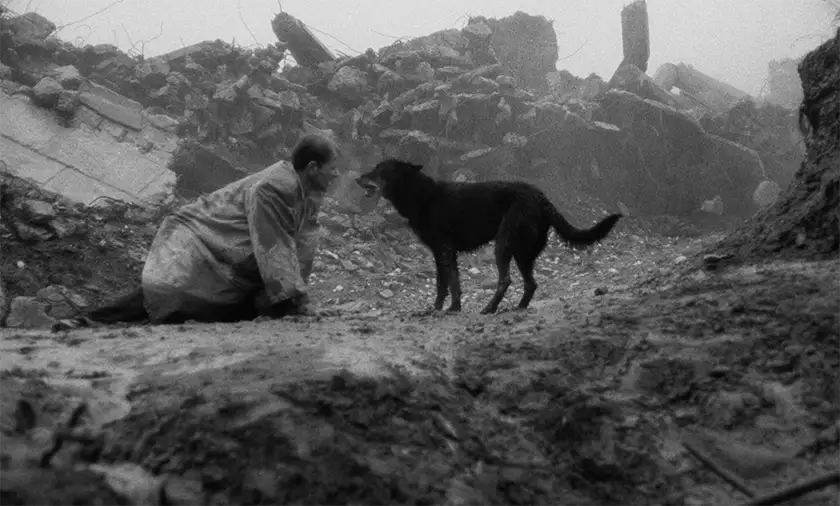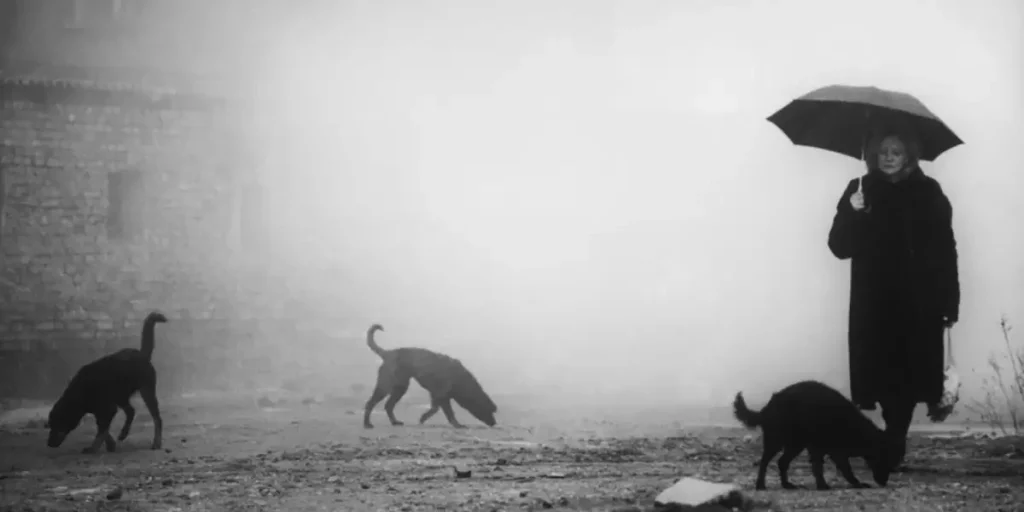Damnation is a pivotal film in Béla Tarr’s filmography, a sensationally shot work that represents one of the earliest examples of the filmmaker’s austere and unique style.
Director: Béla Tarr
Genre: Drama, Crime, Romance
Run Time: 120′
Year of Release: 1987
UK & EIRE 4K Restoration Re-release: August 7, 2024
Where to watch: Re-release at BFI Southbank & select cinemas
Sandwiched neatly in the middle of Béla Tarr’s filmography, both preceded and succeeded by four films either way, Kárhozat (Damnation) feels like a critical moment in the Hungarian auteur’s career. Building on the rigourous style and minimalism seen in Autumn Almanac (1984), itself a film that moved away from Tarr’s more documentary-oriented type of previous works, Damnation sees Tarr’s style flourish in all its bleak and draining brilliance.
The deep darkness of Damnation is something Tarr builds upon further in later works such as Sátántangó (1994), but its 116-minute runtime—almost a short film by Tarr’s standards—make this a more accessible entry point for newcomers to the director.
Co-written by Tarr and László Krasznahorkai, a novelist who has written other screenplays with Tarr, Damnation follows a loathsome, depressed, self-centred man who drinks a lot and has a worrying habit of following a woman around with whom he is obsessed with. Karrer (Miklós Székely, Sátántangó) is in love with Vali Kerekes’ The Singer, an unnamed married woman who sings in a local bar, The Titanik. They have some dalliances together, but ultimately, The Singer ends things, sending the deeply flawed Karrer into a spiral of depression and nihilism.
What follows is a series of mostly lengthy scenes consisting of slow tracking shots and carefully choreographed blocking, a style that has become so synonymous with Tarr’s work as a director. Throughout Damnation, darkness cast by figures or objects frequently submerges our viewpoint, as Tarr drifts the camera slowly around scenes. Such languid movement might feel almost careless if there wasn’t such clear intent and fastidiousness with which Tarr does it. Damnation deposits Tarr’s views in a more scattered way than Sátántangó or Werckmeister Harmonies (2000), but it is still a deeply mesmerising experience with a slow-moving, all-engulfing atmosphere.

As if the constant rain, decrepit streets, or gloomy fog weren’t enough of an indication, Tarr constantly reminds us that Damnation will not end well for any of the characters, especially Karrer. People frequently tell him that things won’t end nicely for him, and he himself admits that his life is essentially travelling to ruin.In the wrong hands, this could be overly morose or gratingly nihilistic, but under Tarr’s guidance, the minimalist but layered screenplay is compellingly, shiveringly fatalistic and also, on occasion, oddly comforting. The rain is obviously used as a pathetic fallacy, but via a monologue by The Singer, there is also some beauty to it.
Tarr’s social realist tendencies still rage in Damnation: a plot point surrounding an illicit package and informing authorities has echoes of Communist-era Hungary; the hardened, wishful gaze of workers staring out at neverending rain is particularly haunting. Damnation is terrifying in how pessimistic and fatalistic it is, whilst Karrer essentially represents the worst of human nature, even being reduced to nothing more than an animal in some scenes. Tarr’s wonderful dark humour is also present throughout the film, such as when one character interrupts a lofty monologue by Karrer to ask him to stop talking about himself so much, an amusing, self-mocking nod to the film itself, which is essentially just Karrer spouting self-pitying monologues.
Damnation can, despite its shorter runtime, become slightly repetitive. It doesn’t quite pack the same punch as later, more refined works such as Sátántangó. Repeat viewings of Damnation will only underline the intelligence of the screenplay, the poetic cinematography, and minimalist camerawork. Just don’t expect to be uplifted by this film. There are some vague moments of hope, but for the most part, Tarr’s film is, as the title suggests, extremely damning of the world and the humans who inhabit it.
A new 4K re-release of Damnation, curated by Curzon and the BFI, will be screened at the BFI Southbank and in select UK and Irish cinemas from August 7, 2024. The BFI will host the complete retrospective at the BFI Southbank as part of their Béla Tarr season.

